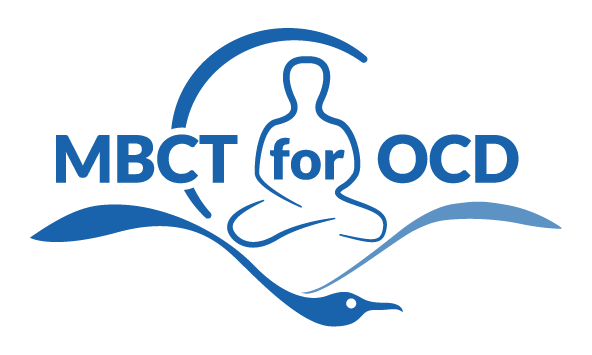Mindfulness-Based Cognitive Therapy for Obsessive Compulsive Disorder Thumbnail Session Rationale and Outline

SESSION 1: Staying present in the present moment as a first step towards freedom
SESSION 2: Understanding the relationship between Mindfulness and Obsessive Compulsive Disorder
SESSION 3: Helping family members support Obsessive Compulsive Disorder patients
SESSION 4: Understanding one’s mistrust, developing real trust
SESSION 5: Using the senses to develop trust
SESSION 6: Developing a healthy relationship with thoughts
SESSION 7: Acceptance as the first step to change
SESSION 8: Mindful “Doing” and Mindful Exposure
SESSION 9: developing self-compassion and self-forgiveness
SESSION 10: Learning to take risks
SESSION 11: Facing life with trust and dealing with obstacles effectively
SESSION 1: Staying present in the present moment as a first step towards freedom
The focus is on understanding what mindfulness is, beginning to understand how it could be an antidote to Obsessive Compulsive Disorder and understanding the relationship between obsessive mechanisms (rituals, safety seeking behaviors) and being on automatic pilot. Through the session exercises, participants begin to recognize the tendency of our minds to wander. Repeatedly catching mind-wandering and coming back to the here and now is how mindfulness can be practiced.
- Mindfulness starts when we recognize the tendency to be on automatic pilot
- Commitment to learn how to step out of it and become aware of each moment
SESSION 2: Understanding the relationship between Mindfulness and Obsessive Compulsive Disorder
This session focuses on understanding the relationship between mindfulness and Obsessive Compulsive Disorder, as obsessive problems can be defined as a lack of basic mindfulness skills (attentional bias, thought-action fusion, rumination, over-interpretation, etc.). Through mindfulness practice and psycho-educational explanations, patients learn to understand the activating and perpetuating cognitive mechanisms of an obsessive problem (problem formulation) and how mindfulness practice can play a role in changing these mechanisms. Focusing on the breath and body helps participants to become more aware of the chatter of the mind (intrusive thoughts, obsessions) and its tendency to control their reactions to everyday events (see also rituals and compulsions).
SESSION 3: Helping family members support Obsessive Compulsive Disorder patients
This is a psycho-educational group session with patients and their family members or people close to them. The aim is to prevent unhelpful family accommodation to the disorder (e.g., reassurance). and to teach what is helpful to their loved one. During this session the rationale of the program will be explained as will the cognitive activating and maintenance mechanisms of an obsessive problem (problem formulation).
- Understanding what is not helpful (or counterproductive) to do and what is helpful to do with Obsessive Compulsive Disorder patients
- Understanding how mindfulness practice can play a role in changing Obsessive Compulsive Disorder mechanisms and create clinical improvement
SESSION 4: Understanding one’s mistrust, developing real trust
Obsessive Compulsive Disorder can be conceptualized as a “trust disorder”. People with obsessive problems tend to lack confidence and mistrust in their personal experience. This specific way of relating to internal states can be considered as a lack of mindfulness skills. In order to develop self-trust the first step is to mindfully cultivate awareness of one’s own internal experience.
- Exploring the different facets of participant’s mistrust
- Understanding the role of mistrust in Obsessive Compulsive Disorder
- Developing a healthy trust
SESSION 5: Using the senses to develop trust
People with obsessive problems very often have little confidence in and pay little attention to their own senses and so when they try to understand reality, they can only trust their often distorted thoughts and beliefs.
In this session, the focus is on sensorial experience and how to develop a new relationship with one’s own senses by validating and using them in order to have a deep, clear and true view of reality, thus preventing the distorted cognitive mechanisms which inevitably lead to obsessive solutions.
- The senses never lie, the mind often do so
- Validating the senses is the best antidote to obsessive doubt.
SESSION 6: Developing a healthy relationship with thoughts
Thinking is the normal function of the mind and thoughts are its normal (and potentially useful) product; they are not a problem in themselves. The problem is the relationship that people with Obsessive Compulsive Disorder have with their own minds. People affected by Obsessive Compulsive Disorder have a challenging and abnormal relationship with their thoughts. The aim of this session is to help participants to better understand their specific relationship with thoughts (e.g., identification, thought-action fusion, judgments) and to adopt a neutral, detached mental attitude towards their ‘problematic’ cognitions, emotional states and sensations that is incompatible with the maladaptive Obsessive Compulsive Disorder behaviors.
- Cultivating and empowering the observing mind
- It is liberating to realize that our thoughts are merely mental events and not facts
- Recognizing the same pattern of recurring intrusive thoughts can help people dis-identify and decenter from their thoughts without resorting to disputation
- Recognizing the way in which emotions affect our thoughts and consequently our behavior as well
SESSION 7: Acceptance as the first step to change
Acceptance is a core issue for obsessive individuals. Obsessive Compulsive Disorder individuals find it extremely difficult to accept some normal and nonthreatening experiences such as intrusive or obsessive thoughts, negative emotions (anxiety, guilt, shame, disgust) and physical sensations. Such non-acceptance is often the starting point of the disorder. For Obsessive Compulsive Disorder patients, acceptance means consciously giving up behaviors which function as experiential avoidance and being willing to experience their emotions and cognitions as they arise, without judgment, interpretation, appraisal, and meta-evaluation.
- Relating to what is experienced in a different way involves “allowing” it to be just as it is, without reacting to it (see compulsions, avoidance, seeking reassurance).
- This attitude of acceptance is a major part of taking care of oneself and seeing more clearly what, if anything, needs to change
- Relating differently involves bringing to experience a sense of allowing it to be without judging or trying to make it different
SESSION 8: Mindful “Doing” and Mindful Exposure
In this session, participants are helped to understand how Mindfulness practice may allow them to develop a more functional “doing mode” (mindful doing), a realistic meaning of their sense of responsibility, which is seriously distorted in people suffering from obsessive problems. Mindfulness practice also helps to create a healthy relationship between their intentions and actions, and to step out of their typical mindless obsessive actions and automatic pilots (see rituals, neutralizations, etc.). Mindful exposure (an integration between ERP-Exposure and Response Prevention, and Mindfulness) outlined in this session, is a core therapeutic practice of this program, through which participants can learn to intentionally enter and remain in contact with the “obsessive” stimulus or situation with a good reality testing and a sense of presence, trust and safety.
- Understanding the power of intentions and acting mindfully for people with Obsessive Compulsive Disorder problems
- Learning to directly expose to obsessive stimuli in a mindful way
- Introducing nourishing activities in one’s life, replacing the spaces before covered by obsessive symptoms
SESSION 9: developing self-compassion and self-forgiveness
Compassion is a quality of the mind and feeling and a core component of all mindfulness-based approaches. Cultivating compassion, particularly self-compassion, can have healing power for people with Obsessive Compulsive Disorder. It helps them start to respect, give care and prevent the suffering they experience. A related antidote to several Obsessive Compulsive Disorder mechanisms is self-forgiveness. It is introduced as a formal practice in this session.
- Cultivating and developing self-compassion to create a deeply different approach towards suffering and distress and learning to take care of it
- Cultivating and developing self-forgiveness to normalize dysfunctional feelings of guilt and responsibility
SESSION 10: Learning to take risks
Authentic responsibility means being aware of the impact of our actions and being willing to feel how our behavior actually affect us and others. One of the best ways to develop an appropriate sense of responsibility and real trust is by taking constructive risks in a mindful way, including risks which are not connected to obsessive problems. This kind of risk-taking behavior leads to empowerment and is useful in preventing experiential avoidance and safety-seeking behaviors.
- Planning and implementing mindful risks
- Implementing “Letting-go rituals” to normalize ritual behaviors and strengthening improvements achieved through the program including motivation to change and practice mindfulness.
- Helping participants to prepare themselves to deal with life and its challenges after the end of the course
SESSION 11: Facing life with trust and dealing with obstacles effectively
This final one-day session is organized as a short mindfulness retreat. Group members are led through intensive mindfulness practice to review what has been taught during the program and to deepen the practice. Participants also share any improvements or difficulties and discuss how they succeded in dealing with obstacles and challenges over the past weeks.
Regular mindfulness practice is emphasized to sustain improvement, and prevent relapse. As a conclusion participants are invited to discuss how they could better prepare themselves to deal with real life with a sense of trust, self-confidence and freedom.





